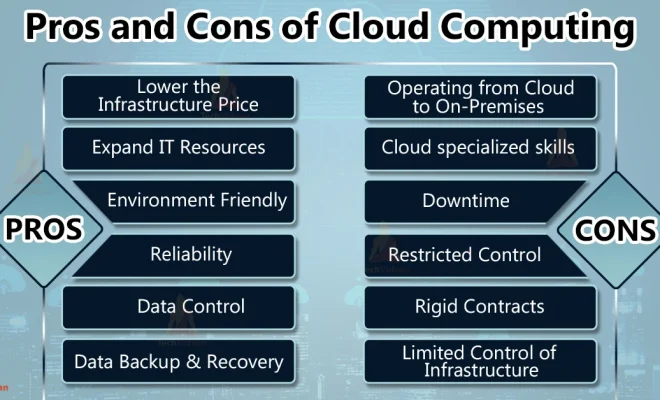Pros and Cons of Cloud Computing

Cloud computing is a technology that has transformed the way we work and store our data. It is a network of remote servers that allows individuals and organizations to store, manage, and process data over the internet rather than on a local server. This form of computing has grown in popularity in recent years, with many businesses turning to cloud computing for their data storage and processing needs. As with any technology, cloud computing has its pros and cons, which we will explore below.
Pros:
1. Cost-effective
One of the most significant advantages of cloud computing is cost effectiveness. Instead of owning and maintaining expensive hardware and software, businesses can rent space on a cloud server on a pay-as-you-go basis, reducing costs considerably.
2. Flexibility
Cloud computing is highly flexible and can be scaled up or down as per your business needs. This means that businesses can easily add or remove resources based on their requirements, making it an excellent option for both small and large organizations.
3. Accessibility
Cloud computing allows users to access their data and applications from any location and device with an internet connection. This makes it easy for employees to work remotely, increasing productivity and efficiency.
4. Security
Cloud computing provides robust security features, including data encryption and automatic backup, which makes it a safer option for businesses compared to traditional data storage methods.
Cons:
1. Dependency on Internet Connectivity
Cloud computing requires a stable and reliable internet connection to function correctly. If the internet is down or slow, it can significantly impact business operations.
2. Limited Control
Since the servers are maintained and managed by a third party, businesses have limited control over their data and applications. This can be a disadvantage for businesses that value complete control over their operations.
3. Data Privacy
Data privacy is a significant concern with cloud computing as user data is stored on a third-party server, making it susceptible to hacking and data breaches. It is essential to ensure that the cloud provider has robust security policies in place to protect user data.
4. Reliance on Service Providers
Organizations must rely heavily on cloud service providers to ensure that their operations run smoothly. A service outage or a data breach from the cloud provider can have significant consequences for the business.
Conclusion:
There is no doubt that cloud computing has revolutionized the way we store and process data. It offers numerous benefits, including cost-effectiveness, flexibility, accessibility, and security. However, it is essential to consider the cons, such as dependency on internet connectivity and limited control, before deciding to switch to cloud computing. Ultimately, businesses must assess their individual needs and weigh the pros and cons before making the switch to cloud computing.





